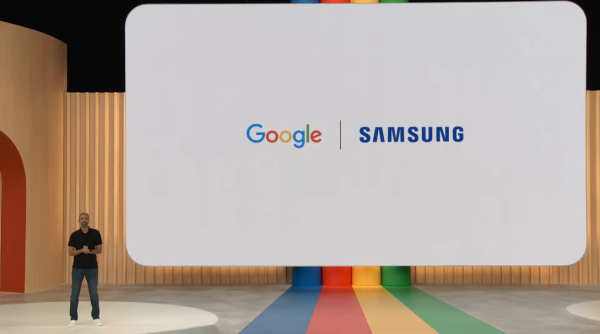Google Hints Samsung’s AR/VR Headset Could Be Revealed ‘Later This Year’
At its I/O 2023 conference, Google hinted that Samsung’s Android-powered AR/VR headset will be launched later this year. Google is collaborating with Samsung on the ‘immersive XR’ device.
Google described its partnership with Samsung on WearOS as “amazing” and that it was excited about its “Android collaboration on immersive XR”, promising to share more “later this year.”

In February this year, Samsung revealed that it had entered a partnership with Google and Qualcomm aimed at developing XR hardware. Qualcomm will provide the chipset for the device with Google handling the software aspect.
A report by a South Korean news outlet claimed that Samsung had already built the headset’s prototypes, was trialing production, and that samples will be shipped to developers this year.
At the I/O conference, Google suggested that the headset’s operating system will be Android-based. Samsung scraped off the smartwatch variant of its Tizen OS two years ago and opted for Google’s WearOS 3 operating system. The two companies, therefore, have a recent track record of collaborating on deep hardware-software integration.
Google is likely to avail the XR version of its Android operating system to other hardware manufacturers just as it did with Android TV.
A report in 2022 by The Verge claimed that Google was building its own headset slated for launch in 2024 which is codenamed Project Iris and which also runs a variant of the Android operating system. The Google headset is reportedly powered by a Google chipset. It is unclear whether Project Iris is still on or whether it will launch much later as a Pixel-branded competitor to the upcoming Samsung headset that also uses an Android variant.
Google Android has previously had virtual reality support via Daydream. The Daydream View headset was launched in 2016 and enabled some high-end smartphones to be inserted into the device for a basic rotation-only virtual reality experience. Daydream View eventually supported some Samsung smartphones.
In 2018, Google also partnered with Lenovo for the release of a $400 standalone virtual reality headset that featured positional tracking and ran Android with Daydream.
Although positionally tracked development kits were sent out, they were never shipped to consumers and the device had to do with a basic laser pointer for its input. Daydream View sales were terminated in 2019 which saw Google abandon the platform.
Last year, Google announced that it had begun the public testing of its Augmented Reality glasses. Google acquired North, along with its Focals smart glasses platform in 2020.
Samsung has had a fairly successful virtual streak, partnering with various companies to launch a series of headsets over the years including the Daydream, Gear VR, and Odyssey. Although these headsets were not successful, the success of the Quest headset over the past three years along with advances in computer vision for mixed reality is prompting some of the old players that had flopped in the past to give XR another go. However, it isn’t clear so far whether the Samsung headset will be a mass-market product or a product that will be geared toward developers and early adopters.
https://virtualrealitytimes.com/2023/05/11/google-hints-samsungs-ar-vr-headset-could-be-revealed-later-this-year/https://virtualrealitytimes.com/wp-content/uploads/2023/05/Google-IO-2023-600x334.pnghttps://virtualrealitytimes.com/wp-content/uploads/2023/05/Google-IO-2023-150x90.pngBusinessGoogleSamsung/GearVRAt its I/O 2023 conference, Google hinted that Samsung’s Android-powered AR/VR headset will be launched later this year. Google is collaborating with Samsung on the ‘immersive XR’ device. Google described its partnership with Samsung on WearOS as “amazing” and that it was excited about its “Android collaboration on immersive XR”,...Rob GrantRob Grant[email protected]AuthorVirtual Reality Times - Metaverse & VR
